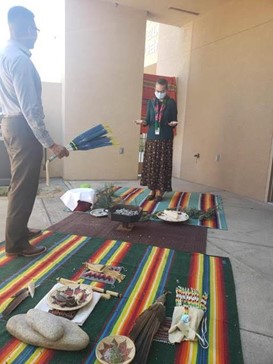Tribal COVID-19 Relief Fund
DONATE
The global COVID-19 pandemic has had a significant impact on the Native American community, especially in New Mexico. Despite making up only 11% of the state’s population, Native Americans accounted for over 50% of the recorded coronavirus cases at the beginning of the pandemic. The Navajo Department of Health has reported over 16,427 positive cases of COVID-19 and 653 deaths to date.
With aggressive relief efforts from non-profit organizations such as First Nations, the Indian Health Service, the Navajo Nation, the State, and the City of Albuquerque, the number of Native American deaths in New Mexico decreased drastically from May to September.

View the data here: https://www.ndoh.navajo-nsn.gov/COVID-19/Data
Our massive COVID-19 Relief Effort involved countless volunteers and donors. Your donations helped us distribute essential items to Native communities in need. We provided protection kits comprising masks, hand sanitizer, household disinfectants, and a week’s supply of food to elders, individuals, families, and communities affected by COVID-19. We deeply appreciate everyone’s support and dedication during this unprecedented time.
There is still an urgent need to offer COVID-19-specific assistance to the vulnerable members of tribal communities. Since the pandemic started in March 2020, FNCH has been identifying individuals and families affected by COVID-19. Requests for assistance are also made to FNCH through the Collaborative Resource Group, which includes representatives from the City of Albuquerque, Indian Health Service Hospitals, the University of New Mexico Hospital, and the Veterans Affairs Hospital. The battle is not yet over.
Please Consider Donating to FNCH’s COVID Relief Fund.
To make a donation, please see our Donate Page and select the option to donate to FNCH’s COVID Relief fund.
If you would like a donation receipt, please contact linda.son-stone@fnch.org.
Thank you for making a difference!



TRIBAL COVID-19 RELIEF FUND PLAN FOR 2021
FNCH will continue to identify communities with gaps in access to basic needs during the COVID-19 pandemic and lockdowns. In the second phase of this effort, we will target specific vulnerable Native populations by collaborating with Community Health Representatives (CHRs) across the state of New Mexico. CHRs function as tribal case managers for their community and serve specific local chapters of tribal government. Through the vast and statewide network, FNCH has established, delivery of health supplies and food will arrive directly and efficiently to those in need. This collaboration has been executed successfully for the last month and will continue on into next year.

HELP US TO PROVIDE BASIC NEEDS TO THIS COMMUNITY
YOUR DONATION WILL ALLOW FOR PERSONALIZED AND MUCH NEEDED SUPPORT FOR TRIBAL MEMBERS
DONATE
**Tribal COVID-19 Care & Protection Kits**
- Identify specific families/individuals through needs assessment
- Drop off center is at FNCH, where package Care and Protection Kits will be created
- Distribute resources to Tribal Urban, Displaced Tribal Community families and larger Tribal Communities

Needed Supplies:
- Hand Sanitizer
- Household Disinfectant
- Cloth Masks PPEs
- Non-perishable Food
- Bottled Water
- Diapers and baby food
Also provided by FNCH:
- Shelter Resources
- Burial Assistance
- Connection to Telehealth
Resources offered through FNCH:
- Socially Distanced Spiritual Support/Tribal Ceremonies
First Nation’s Staff Support Blessing, April 16, 2020: a Cedar and Traditional “Chil Azee” Blessing with an emphasis on PPE and Social Distancing Health Practices
Project Members

Lorenzo R. Jim (Dine/Navajo) is a Licensed Alcohol/Drug Abuse Counselor and certified Traditional Counselor/Hataalii with the Dine Hataalii Association currently managing the Native American Traditional Wellness & Integrative Care Program at First Nations Community HealthSource. Mr. Jim has extensive knowledge and experience in program/curriculum development toward the integration of Native American Traditional/Cultural wellness and curative processes into modern health care, legal, educational and social systems. He currently serves as the Tribal Liaison for Bernalillo County Metropolitan Courts, Cultural Services Provider at the Children, Youth & Families Department, Juvenile Justice Services and is a Native American Care Chaplain at the University of New Mexico Hospital.

Dr. Alissa Greenbaum is a board-certified general surgeon and graduate of the University of New Mexico General Surgery Residency Program and Oregon Health and Science University Medical School. She is currently completing a two-year specialty fellowship training in surgical oncology at the Rutgers Cancer Institute of New Jersey. She is an active member of the Society of Surgical Oncology, American College of Surgeons and the Americas Hepato-Pancreato-Biliary Association. Her research is focused on improving surgical outcomes for cancer patients and addressing ethnic and racial disparities in cancer care delivery. She is honored to partner with First Nations Community HealthSource to empower Native American communities and individuals to pursue cultural competence and equality in healthcare.

Linda Stone has served as the CEO of First Nations Community HealthSource for the past 13 years. She has a doctorate degree in Psychology from Harvard University. She is committed and passionate about working with un- and underserved community members. She served as a team member of First Nations Community HealthSource’s Circles of Care and All My Relations Project prior to assuming the role as the CEO. Her past experiences also include providing clinical services, program evaluation and research. Prior to coming to First Nations, she worked in Boston with inner city, low income, minority families conducting clinical assessments, treatment and program evaluation. She is married and the mother of three children.

